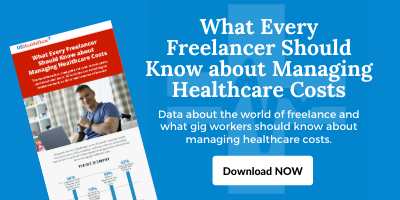Many businesses are moving away from the traditional full-time employee model in favor of hiring contractors on a freelance basis. While this may offer freelancers more flexibility in their business and the freedom to negotiate rates, it also presents an issue when it comes to healthcare coverage.
Workers on traditional payroll are likely to have the benefit of employer-provided health care coverage, among other financial perks. However, gig workers do not have such luxuries available to them. They are tasked with saving for their own retirement fund, accounting for tax payments at tax time, and paying for their own healthcare costs out of pocket.
The Surge in the Freelance Labor Market
The freelancing market is growing across the US. Today, the share of gig workers in American businesses is 15 percent higher than it was in 2010. It’s estimated that approximately 36 percent of American workers are involved in the gig economy. If this labor market keeps up with its current rate of growth, it could involve over half of the US workforce by 2027.
 About a third of these workers are over the age of 55. Workers in this demographic are not yet able to avail themselves of Medicare, but they may have more health care concerns to manage, making finding adequate help for medical costs imperative.
About a third of these workers are over the age of 55. Workers in this demographic are not yet able to avail themselves of Medicare, but they may have more health care concerns to manage, making finding adequate help for medical costs imperative.
Freelancers always have the option to pay for their own medical insurance plan to help cover the cost of healthcare. However, the costs associated with these policies are often higher than what some Americans might require in medical care.
According to eHealth, the average cost of health insurance premiums for individuals is $440, and $1,168 for a family. Deductibles are other expenses related to health insurance policies that can eat into a household’s budget. The average deductible for an individual and family is $4,328 and $8,352, respectively.

Gig workers who hold health insurance policies are looking at spending hundreds or even thousands of dollars a year. Even if they don’t end up requiring much actual medical care, they’re still on the hook for paying exorbitant insurance premiums.
How Freelancers Can Save on Healthcare Costs
Many freelancers have discovered a better way to manage healthcare costs: a health sharing program.
Health sharing programs have individuals make contributions to a health share plan on a monthly basis. Then, when the need arises, members request payment for eligible medical expenses from the health share program.
Health share programs also provide freelancers with the freedom to choose their own doctors, their own prescription drugs, and their own level of health share program coverage.
At USHealthshare, we offer a number of options for freelancers who are looking to save money on healthcare costs. Get in touch with us today to discuss your options.
